Environment
From the first chapter of the Bible, we have been called to be responsible caretakers of all of creation.
Key Insights
|
Sharing In Creation
Our call to be responsible stewards of the environment is rooted in the biblical creation stories in which the earth was entrusted to our care. Humankind is to share in God's act of creation and complete it. Solidarity
The challenge of protecting the environment requires that we look beyond national, cultural, and other human boundaries to work for the common good of all. |
Stewardship
Care for creation is fundamentally an act of stewardship, and raises the question of how we can receive the gift of creation gratefully, nurture it responsibly, share it justly and charitably, and return it to God abundantly. In the Spirit of St. Francis
St. Francis showed us how to love all of creation and recognize God working through it. Franciscans have carried forward this tradition through the centuries. |
People
Respect for the environment is tied to our respect for the human person. Abuse of the environmental disproportionally impacts the poor, but we are all dependent on the earth for our very existence. |
Quotations
The LORD God then took the man and settled him in the garden of Eden, to cultivate and care for it. Genesis 2:15
The Catholic Church brings a distinct perspective to the discussion of environmental questions, by lifting up the moral dimensions of these issues and the needs of the most vulnerable among us. This unique contribution is rooted in Catholic teaching calling us to care for creation and for "the least of these." (Mt 25:40) Of particular concern to the Church is how environmental problems and our response to these challenges will affect poor and vulnerable people at home and around the world. U.S. Conference of Catholic Bishops website
[T]he Church... has never ceased to recall that respect for the Creator’s imprint in all creation, leads to a better understanding of our true and deepest human identity.... Today more than ever, it has become clear that respect for the environment can not forget the recognition of the value of the human person and its inviolability at every stage and in every condition of life. Respect for the human being and respect for nature are one, but both can grow and find their right measure if we respect in the human being and in nature the Creator and his creation. Pope Benedict XVI, 2011
Global climate is by its very nature a part of the planetary commons. The earth's atmosphere encompasses all people, creatures, and habitats. The melting of ice sheets and glaciers, the destruction of rain forests, and the pollution of water in one place can have environmental impacts elsewhere. As Pope John Paul II has said, "We cannot interfere in one area of the ecosystem without paying due attention both to the consequences of such interference in other areas and to the well being of future generations." Responses to global climate change should reflect our interdependence and common responsibility for the future of our planet. Individual nations must measure their own self-interest against the greater common good and contribute equitably to global solutions. U.S. Bishops, 2001
Equally worrying is the ecological question which accompanies the problem of consumerism and which is closely connected to it. In his desire to have and to enjoy rather than to be and to grow, man consumes the resources of the earth and his own life in an excessive and disordered way. At the root of the senseless destruction of the natural environment lies an anthropological error, which unfortunately is widespread in our day. Man, who discovers his capacity to transform and in a certain sense create the world through his own work, forgets that this is always based on God's prior and original gift of the things that are. Man thinks that he can make arbitrary use of the earth, subjecting it without restraint to his will, as though it did not have its own requisites and a prior God-given purpose, which man can indeed develop but must not betray. Instead of carrying out his role as a co-operator with God in the work of creation, man sets himself up in place of God and thus ends up provoking a rebellion on the part of nature, which is more tyrannized than governed by him. Pope John Paul II
On the Hundredth Year (Centesimus Annus) What does cultivating and caring for the earth mean? Are we truly cultivating and caring for creation? Or are we exploiting and neglecting it? The verb "to cultivate" reminds me of the care that the farmer has for his land so that it bear fruit, and it is shared: how much attention, passion and dedication! Cultivating and caring for creation is God’s indication given to each one of us not only at the beginning of history; it is part of His project; it means nurturing the world with responsibility and transforming it into a garden, a habitable place for everyone. Benedict XVI recalled several times that this task entrusted to us by God the Creator requires us to grasp the rhythm and logic of creation. But we are often driven by pride of domination, of possessions, manipulation, of exploitation; we do not “care” for it, we do not respect it, we do not consider it as a free gift that we must care for. We are losing the attitude of wonder, contemplation, listening to creation; thus we are no longer able to read what Benedict XVI calls "the rhythm of the love story of God and man." Why does this happen? Why do we think and live in a horizontal manner, we have moved away from God, we no longer read His signs. |
Grateful for the gift of creation... we invite Catholics and men and women of good will in every walk of life to consider with us the moral issues raised by the environmental crisis.... These are matters of powerful urgency and major consequence. They constitute an exceptional call to conversion. As individuals, as institutions, as a people, we need a change of heart to preserve and protect the planet for our children and for generations yet unborn. U.S. Bishops, 1992
Today the great gift of God’s Creation is exposed to serious dangers and lifestyles which can degrade it. Environmental pollution is making particularly unsustainable the lives of the poor of the world … we must pledge ourselves to take care of creation and to share its resources in solidarity. Pope Benedict XVI
Our earth speaks to us, and we must listen if we want to survive. Pope Benedict XVI
[S]tewardship of the world is expressed by Stewardship: A Disciple's Response
U.S. Bishops Be praised, my Lord, through all Your creatures, St. Francis of Assisi
I would like to ask all those who have positions of responsibility in economic, political and social life, and all men and women of goodwill: Let us be protectors of creation, protectors of God's plan inscribed in nature, protectors of one another and of the environment. Pope Francis
Inaugural Mass, 2013 Take good care of creation. St. Francis wanted that. People occasionally forgive, but nature never does. If we don’t take care of the environment, there’s no way of getting around it. |
Scripture
- Genesis 1:1-31: God made the heavens and the earth and it was good.
- Genesis 2:15: Humans are commanded to care for God’s creation.
- Leviticus 25:1-7: The land itself must be given a rest and not abused.
- Deuteronomy 10:14: All of heaven and earth belong to the Lord.
- Psalm 24:1-2: All the earth is the Lord’s.
- Daniel 3:56-82: Creation proclaims the glory of God.
- Matthew 6:25-34: God loves and cares for all of creation.
- Romans 1:20: Creation reveals the nature of God.
- 1 Corinthians 10:26: Creation and all created things are inherently good because they are of the Lord.
Many resources regarding the environment can be found under the broader topic of Voluntary Simplicity.
Books
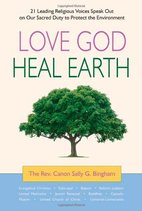
Love God, Heal Earth: 21 Leading Religious Voices Speak Out on Our Sacred Duty to Protect the Environment
The Rev. Canon Sally G. Bingham Foremost religious leaders from diverse faith communities respond to the most controversial question of our time: Can we save the earth? The answer could hinge on the phenomenon of the fast-growing interfaith religious environmental movement. The author makes the case for environmental stewardship that cuts across old divisions of faith and politics. She presents 20 fellow religious leaders and eminent scholars (from rabbis to evangelicals to Catholics, Muslims and Buddhists) each contributing an original essay-chapter, with personal stories of awakening to the urgent need for environmental awareness and action. From all parts of the religious and political spectrum, they come together to tell why caring for the earth is a spiritual mandate, giving chapter and verse and offering plans of action that go beyond the walls of religious congregations and out into the broader community. (Amazon) 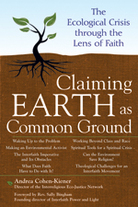
Claiming Earth as Common Ground: The Ecological Crisis Through the Lens of Faith
Rabbi Andrea Cohen-Kiener Can religious people save the environment? Can the environmental challenge save religion? Our planet is in trouble, and it will take an amazingly large and powerful force to shift into a more sustainable way of living. Spiritual leader and environmental activist Andrea Cohen-Kiener tells us that people of faith have the numbers, the passion, and the mandate to do it--and that nothing else is strong enough to counterbalance "business as usual." In this urgent call to action, Cohen-Kiener gathers insights from ecology coalitions, emerging theologies, and spiritual and environmental activists to rally and inspire us to work across denominational lines in order to fulfill our sacred imperative to care for God's creation. Cohen-Kiener and contributors clearly outline the shared values of our faith traditions that drive our commitment to care for the earth. Acknowledging the challenges in working together to implement positive change, they present steps--both big and small, for individuals and groups--for reversing our direction from consumption to sustainability. (Amazon) 
The Green Bible: Understand the Bible's Powerful Message For the Earth
Is God green? Did Jesus have anything to say about the environment? With over 1,000 references to the earth in the Bible, the message is clear. All of God's creation—nature, animals, and humanity—are inextricably linked to one another. As creation cares for us, we too are called to care for creation and engage in the work of healing and sustaining it. Read the scriptures anew with The Green Bible as your guide and discover how caring for the earth is not only a calling, but also a lifestyle. (Amazon) 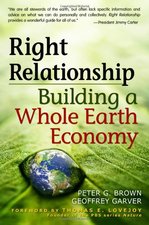
Right Relationship: Building a Whole Earth Economy
Peter G Brown, Geoffrey Garver Our current economic system is unsustainable. Its fundamental elements unlimited growth and endless wealth accumulation fly in the face of the fact that the Earths resources are clearly finite. The destructive effects of this denial of reality are wreaking havoc on our ecological and social systems. But what is the alternative? We need to go beyond simply fixing problems as they arise, or even as we anticipate them, and offer a comprehensive new economic model. It is a moral imperative. (Amazon) 
77 Ways to Save Money and Energy at Your Church and School
Dave Troesh This book was written specifically for churches and schools. It is short, concise, and easy to understand. Every pastor or principal who follows even a few suggestions can expect to reduce their energy expenses. Author Dave Troesch’s own parish was able to save over $6,100 annually in electricity costs alone. He gives ideas on how to create the most important element of a successful environmental upgrade—an enthusiastic, management-backed Green Team.
|
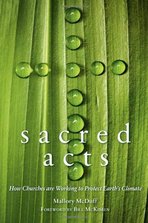
Sacred Acts: How Churches are Working to Protect Earth's Climate
Mallory McDuff From evangelicals to Episcopalians, people of faith are mobilizing to confront climate change. This unique anthology brings together stories from all over North America of contemporary church leaders, parishioners, and religious activists who are working to define a new environmental movement, where honoring the Creator means protecting the planet. Sacred Acts documents the diverse actions taken by churches to address climate change through stewardship, advocacy, spirituality, and justice. Contributions from leading Christian voices such as Norman Wirzba and the Reverend Canon Sally Bingham detail the work of faith communities. (Amazon) 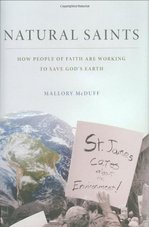
Natural Saints: How People of Faith are Working to Save God's Earth
Mallory McDuff At La Capilla de Santa María, parishioners weatherized their church in an effort to decrease the utility bills that took up a fifth of the annual budget. At Jubilee Community Church, parents and the education coordinator revised the Sunday School curriculum to integrate care of creation for all age levels. And at All People's Church in Milwaukee, the sanctuary became a free farmer's market on Sundays with produce grown by youth. Natural Saints shares the stories and strategies of contemporary church leaders, parishioners, and religious environmentalists working to define a new environmental movement, where justice as a priority for the church means a clean and safe environment for all. Mallory McDuff shows that a focus on God's earth is transforming both people and congregations, creating more relevant and powerful ministries . As a result, people of faith are forming a new environmental movement with a moral mandate to care for God's earth. McDuff highlights eight key ministries: protecting human dignity, feeding the hungry, creating sacred spaces, responding to natural disasters, promoting justice, making a pilgrimage, educating youth, and bearing witness. With two daughters in tow, she traveled across the country to document environmental actions grounded in faith. This journey transformed the author's own faith and hope for a sustainable future. Congregations and individuals seeking to integrate care of creation into their faith community will find inspiration and concrete advice in the lives of these natural saints. (Amazon) 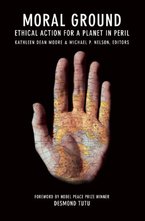
Moral Ground: Ethical Action for a Planet in Peril
Kathleen Dean Moore Moral Ground brings together the testimony of over 80 visionaries — theologians and religious leaders, scientists, elected officials, business leaders, naturists, activists, and writers — to present a diverse and compelling call to honor our individual and collective moral responsibilities to our planet. In the face of environmental degradation and global climate change, scientific knowledge alone does not tell us what we ought to do. The missing premise of the argument and much-needed centerpiece in the debate to date has been the need for ethical values, moral guidance, and principled reasons for doing the right thing for our planet, its animals, its plants, and its people. This book encourages a newly discovered, or rediscovered, commitment to consensus about our ethical obligation to the future and why it’s wrong to wreck the world. (Amazon) 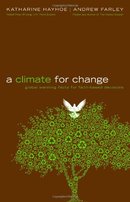
A Climate for Change: Global Warming Facts for Faith-Based Decisions
Katharine Hayhoe Most Christian lifestyle or environmental books focus on how to live in a sustainable and conservational manner. A Climate For Change shows why Christians should be living that way, and the consequences of doing so. Drawing on the two authors' experiences, one as an internationally recognized climate scientist and the other as an evangelical leader of a growing church, this book explains the science underlying global warming, the impact that human activities have on it, and how our Christian faith should play a significant role in guiding our opinions and actions on this important issue. (Amazon) |
Articles
- Where Are the Catholic Environmentalists? (America Magazine)
- Some Bright Ideas For Earth Day (U.S. Catholic)
- Pope says 'throwaway culture' harms environment and human life (Catholic News Service)
- Pope Benedict XVI: the first green pontiff? (The Guardian)
- Should we feel Catholic guilt about the environment? (U.S. Catholic)
- Introduction To Catholic Environmental Teaching (St. Kateri Tekakwitha Conservation Center)
- Ten Commandments or Guiding Principles of the Environment (St. Kateri Tekakwitha Conservation Center)
- Religious by nature: An interview with Keith Warner, OFM on the environment (U.S. Catholic)
- Pope Francis a 'Franciscan Jesuit' when it comes to environment (National Catholic Reporter)
- Caring For God's Creation: Books For Budding Environmentalists (America Magazine)
- Catholic Faith Tradition of Stewardship: Address on Climate Change (Archbishop Celestino Migliore, the Vatican’s U.N. Nuncio)
Organizations & Websites

U.S. Conference of Catholic Bishops:
The Environment Statements and resources regarding the environment. Also see resources on their original page on environmental justice. 
Saint Kateri Tekakwitha Conservation Center
Long before today's environmental movement, the Bible and Tradition of the Catholic Church taught us to be stewards of God's creation with love and wisdom. Our mission is to promote ecology, environmental justice, authentic and sustainable development, renewable energy, and stewardship of the Earth, in light of sacred Scripture and the Tradition of the Roman Catholic Church. Our website features an extensive collection of writings about ecology and the environment from a variety of Catholic sources. |

Catholic Climate Covenant
After decades of steady progress in reclaiming and advancing the Catholic Church’s efforts to embrace an ethic of environmental stewardship, the Catholic Coalition on Climate Change launched an unprecedented and historical campaign, the Catholic Climate Covenant, to take responsibility for our contribution to climate change and do what we do best: be advocates for those who will be left out of the public policy debate on climate change. |

Interfaith Power & Light
Encourages congregations to be faithful stewards of Creation by responding to global warming through the promotion of energy conservation, energy efficiency, and renewable energy. This campaign intends to protect the earth’s ecosystems, safeguard the health of all Creation, and ensure sufficient, sustainable energy for all. Has |
Parish Resources
|
4-page overview handout used as a bulletin wrapper to introduce the concept to a parish.
Your browser does not support viewing this document. Click here to download the document.
|
4-page overview handout used as a bulletin wrapper to explore environmental justice, particularly as New Year's resolutions.
Your browser does not support viewing this document. Click here to download the document.
|
Related To
|
Caring for the earth is a form of stewardship.
|
Creating the possessions we end up buying has an impact on the environment.
|
One of the motivations of voluntary simplicity is to address environmental concerns.
|
Sabbath/Jubilee values teach us that there are enough resources for everyone if we only take our share.
|
